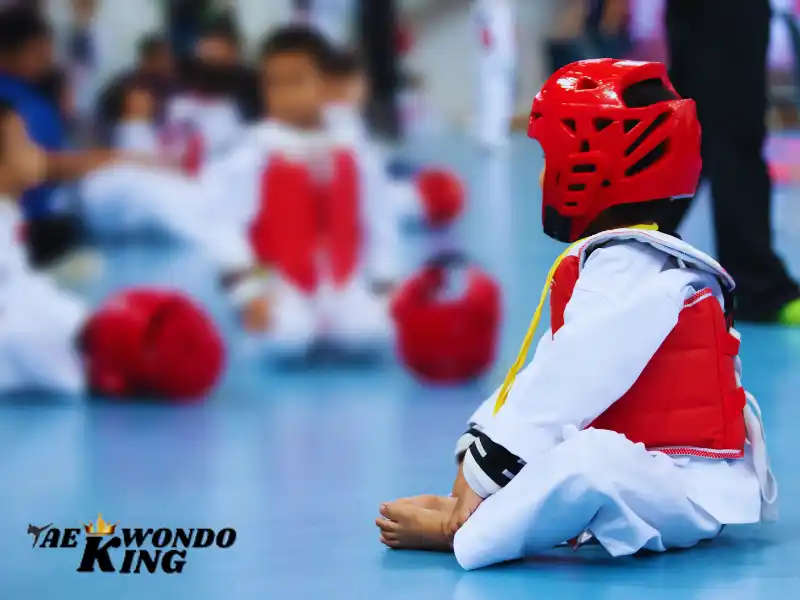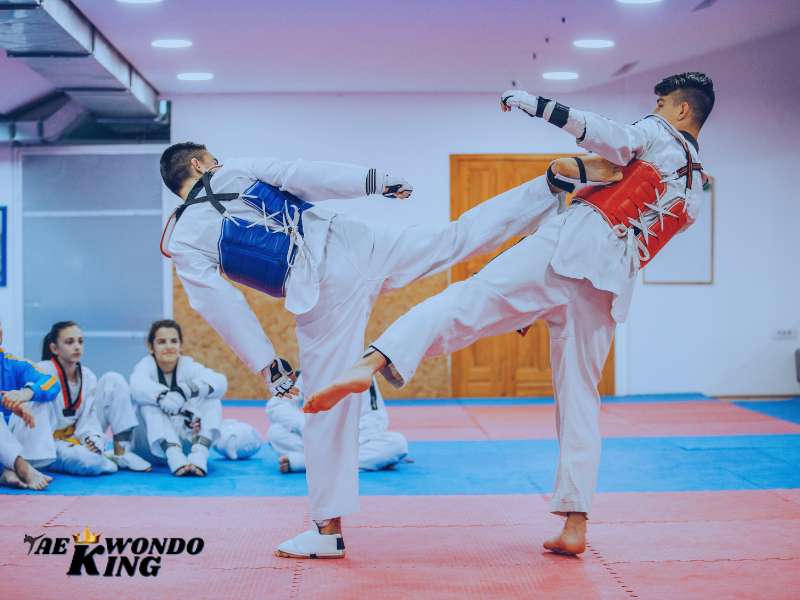From a young age, children are expected to be physically active. If a parent wants to help their hyperactive child get more exercise and focus, taekwondo might be a good choice. Think again if you consider taking Taekwondo to help your kid get their energy out. Today we are talking about whether Is Taekwondo good for hyperactive kids.
Hyperactive kids can find it challenging to focus on schoolwork, but Taekwondo might help. A new study suggests that those who train in martial arts tend to become more focused, calmer, and conscientious. Which martial arts is best for my kid?
Research to determine the effectiveness of Taekwondo

The Taekwondo program for hyperactive kids is a great way to reduce the aggressive and destructive behavior associated with this condition. The program involves a rigorous fitness regimen that includes strength training, stretching, cardio, and mental/emotional exercises. These types of programs have been shown to have a positive impact on children with ADHD. How can learning Taekwondo basic skills help you physically and emotionally?
This research found that Taekwondo is an effective exercise program for hyperactive children. Taekwondo is a form of martial arts that teaches students to focus and improve self-discipline and self-control. Taekwondo is the Best Martial Arts For Kids!
Find studies comparing Taekwondo to other sports
Taekwondo may be the best sport for hyperactive kids. A study at the University of Colorado at Boulder found that children who train in Taekwondo are less likely to display ADHD symptoms than children who play soccer or basketball. Researchers also found that the physical activity and discipline that comes from learning martial arts are ideal for hyperactive kids. Does Taekwondo martial arts Work Better Than Kung Fu?
Compare other Martial Arts and Taekwondo for hyperactive kids
If your kid is hyperactive, Taekwondo may be a great option. There are many different forms of Taekwondo, including the traditional (also known as classical) style, modern taekwondo, and international taekwondo. They are all great choices for kids with ADHD and ADD. Can a professional taekwondo player beat a boxing player?
In general, children who participate in martial arts are better adjusted than those who don’t. Taekwondo teaches children the value of perseverance and discipline. Taekwondo vs Judo, Why Taekwondo is best?
Evaluate the costs, benefits, and risks of Taekwondo for hyperactive kids
Taekwondo may seem like an expensive sport, but according to research conducted by The New England Journal of Medicine, it could be a worthwhile investment. Researchers found that children who participated in taekwondo training twice weekly for three years were 40% less likely to develop ADHD than non-trained children. Although there is no cure for ADHD, taekwondo can be used as an exercise program that will help to keep children active and focused. What are the risks of Taekwondo?
A risk analysis is just another way to describe a cost-benefit analysis. This is often done in business, especially when the costs of failure are high. This means we have to consider how much it would cost if the program fails or the program’s effectiveness is low, compared to the possible benefits of the program. What are the benefits of Taekwondo that will help you as a student?
Assess the health issues related to Taekwondo for hyperactive kids
Taekwondo for Kids is a program developed by the U.S. Department of Education, Office of Safe and Drug-Free Schools, as part of a nationwide initiative to teach positive behavior to youth. The program encourages children to build self-control, respect, responsibility, and responsibility for their actions through learning Taekwondo. It was developed in response to rising violence in schools. Learn Taekwondo martial arts and Get Healthy
The program emphasizes discipline, sportsmanship, nonviolence, self-control, and self-defense in a safe environment. It offers an opportunity for kids to improve their social skills and develop physical fitness. It also helps kids improve their self-confidence, self-esteem, and respect for others.
Choose the right Taekwondo instructor for your kid
Hyperactive children need a Taekwondo instructor who is capable of handling the energy of a child without getting frustrated. There is no single type of person who fits the bill perfectly. If the instructor has a calm demeanor and uses appropriate language, he or she can successfully control the hyperactivity of the children. For this reason, parents should consider carefully the instructors’ demeanor, teaching method, and level of professionalism. Why should children learn Taekwondo?
Understand the philosophy behind Taekwondo for hyperactive kids
The philosophy behind Taekwondo is based on the idea of self-defense. This means that the focus isn’t on defeating your opponent, but rather on protecting yourself and making sure you come out of it alive. This means that there aren’t any rules or set techniques, so there is no single way of fighting. Does taekwondo use only feet?
Instead, a Taekwondo fighter learns how to deal with a variety of situations and conditions. Taekwondo teaches a lot of valuable life lessons that most people can take away from it, including learning how to deal with different kinds of stress and being able to think quickly under pressure. Does Taekwondo increase IQ?
How does the structured environment of Taekwondo classes benefit hyperactive children?
The structured environment of Taekwondo classes can be highly beneficial for hyperactive children in multiple ways. The clear rules and routines of Taekwondo provide a sense of structure and discipline, helping these children manage their impulses and regulate their behavior more effectively.
Moreover, the focused and goal-oriented nature of Taekwondo training allows hyperactive children to channel their excess energy into productive outlets. The physical activity involved in Taekwondo classes enables them to release pent-up energy, thereby enhancing their concentration and reducing hyperactivity.
Additionally, Taekwondo classes promote self-control and self-discipline through the practice of various techniques and forms. This fosters the development of important skills for managing impulses and staying focused, not only within the martial arts environment but also in other aspects of their lives.
Furthermore, the positive reinforcement and encouragement received in the Taekwondo classes can significantly boost the self-esteem and confidence of hyperactive children. This sense of achievement and self-worth can have a long-lasting impact on their overall well-being and their ability to cope with challenges.
Learn Taekwondo skills that will be useful

Learning taekwondo is a great exercise routine for kids. They learn discipline and self-control. There are many styles and classes that children can take part in. You can teach your child to kick, punch, or spar with a friend or family member. Many schools offer summer camp programs that are beneficial to younger children who love sports. What Is The Best Taekwondo Or Karate – Which Is Better?
In conclusion,
Taekwondo is a form of martial art that requires children to have a great deal of physical energy. They are constantly moving their bodies. It’s challenging for them to learn because they can move too fast. Children who learn Taekwondo build better balance and coordination. They are learning how to concentrate and focus. This gives them the ability to learn other skills like self-discipline. Is Taekwondo good exercise for kids?
FAQ
Can Taekwondo help hyperactive kids channel their energy and improve focus?
Yes, Taekwondo can be a beneficial activity for hyperactive children. Taekwondo involves physical activity, discipline, and focus, which can help children with hyperactivity channel their energy positively. The structured nature of Taekwondo classes can also help improve focus and concentration skills. Additionally, the practice of Taekwondo emphasizes self-control and self-discipline, which can be valuable for hyperactive children in learning to manage their impulses.
Are there specific Taekwondo techniques or exercises that help hyperactive children manage their impulses and emotions?
Yes, there are specific Taekwondo techniques and exercises that can help hyperactive children manage their impulses and emotions. Taekwondo focuses on discipline, self-control, and concentration, which can be beneficial for children with hyperactivity. Through regular practice, children can learn to channel their energy in a controlled manner, improve their focus, and develop self-discipline. Taekwondo exercises such as forms (patterns of movements), sparring, and meditation can help children with hyperactivity improve their physical and mental discipline, leading to better impulse control and emotional regulation. It is important to consult with a qualified Taekwondo instructor who can tailor the training to the specific needs of the child.
Can Taekwondo be adapted to accommodate the needs of hyperactive kids, and are instructors trained to work with them effectively?
Yes, Taekwondo can be modified to meet the needs of hyperactive children. Instructors are typically trained to work with children of all abilities, including those with hyperactivity. They may use adapted techniques, shorter class durations, or add extra activities to help engage and focus hyperactive children. It’s crucial to communicate with the instructor ahead of time to discuss any specific needs or concerns you may have for your child.
How can Taekwondo help boost hyperactive kids’ self-esteem and confidence?
Taekwondo has the potential to enhance self-esteem and confidence in hyperactive children by providing them with a structured and disciplined environment. By practicing taekwondo, children can develop self-control, focus, and discipline, allowing them to direct their energy positively. The practice of taekwondo also emphasizes the importance of setting and achieving goals, which can foster a sense of accomplishment and boost self-confidence. Moreover, the supportive and encouraging atmosphere of taekwondo classes can help hyperactive children feel a sense of belonging and acceptance, further contributing to their self-esteem.
Is Taekwondo a safe and suitable physical activity for hyperactive kids, even if they have varying levels of physical ability?
Taekwondo can be a safe and suitable physical activity for hyperactive children, regardless of their varying levels of physical ability. The practice of Taekwondo places a strong emphasis on discipline, self-control, and focus, all of which can be extremely beneficial for hyperactive kids. Moreover, the structured environment of Taekwondo classes can help these children learn to follow instructions and enhance their attention span. However, it is crucial to consult with a qualified instructor who can assess the child’s abilities and make any necessary modifications or accommodations.
Are there any success stories or testimonials from parents of hyperactive kids who have seen positive changes through Taekwondo?
Yes, there are numerous success stories and testimonials from parents of children with hyperactivity who have witnessed positive transformations through practicing Taekwondo. Taekwondo offers a structured and disciplined setting that can assist in enhancing a child’s focus, self-control, and overall behavior. Many parents have shared that their children have gained increased self-confidence, improved concentration, better impulse control, and a decrease in hyperactive behaviors after engaging in Taekwondo classes. These positive changes have had a substantial impact on their academic performance, social skills, and overall well-being.
How can parents or guardians get their hyperactive kids started with Taekwondo, and what should they look for in a Taekwondo school?
To get hyperactive kids started with Taekwondo, parents or guardians can begin by researching local Taekwondo schools or clubs in their area. They should look for schools that specifically mention classes for children or have experience working with kids. It’s important to find a school that has qualified instructors who are patient, understanding, and skilled in working with children with hyperactivity. Additionally, parents should consider visiting the school beforehand to observe a class and see how the instructors interact with the students. It’s also beneficial to talk to other parents or read reviews to get a sense of the school’s reputation and the experiences of other children.
What role does a supportive Taekwondo community play in helping hyperactive children stay engaged and motivated?
A supportive Taekwondo community is incredibly important for hyperactive children as it can help them stay engaged and motivated. The structured environment and discipline of Taekwondo can offer a positive outlet for their energy and aid in the development of focus and self-control. Furthermore, the encouragement and support from instructors and fellow students can greatly enhance their self-esteem and confidence. The sense of belonging and camaraderie within the Taekwondo community can also serve as a valuable support system for these children, ensuring that they remain motivated and committed to their training.
Is Taekwondo equally effective for hyperactive kids of different ages, from young children to teenagers?
Taekwondo is a martial art that can be equally effective for hyperactive kids of various ages, ranging from young children to teenagers. It offers a structured and disciplined environment that helps positively channel their energy. By participating in Taekwondo, kids can enhance their focus, self-control, and self-discipline, while also improving their physical fitness and coordination. However, it is crucial to take into account the unique needs and abilities of each child and seek guidance from a qualified instructor to ensure they receive appropriate instruction and support.

Ehatasamul Alom is an esteemed Taekwondo 3rd Dan Black Belt with over 12 years of experience in this dynamic martial art. Born in Rajshahi, Bangladesh, Ehatasamul’s journey with Taekwondo began at the tender age of seven. His passion led him to compete at national and international levels, where he has bagged numerous awards and honors. He is also a member of the Taekwondo National Referee Panel.
With a Bachelor’s degree in Sports Science from the prestigious Rajshahi University, Ehatasamul has a deep understanding of the technical and scientific aspects of martial arts.
In 2022, Ehatasamul created the “TaekwondoKing.com” blog to share his knowledge and experiences. His articles focus on Taekwondo training techniques, competition strategies, and the art’s rich history and philosophy. He also writes about the importance of mental fortitude and discipline, key aspects of his teaching philosophy. His goal is to inspire both beginners and seasoned practitioners worldwide through insightful and engaging content.
